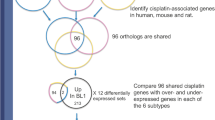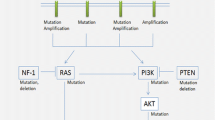Abstract
Expression of the O6-methylguanine-DNA methyltransferase (MGMT) gene has been shown to correlate with clinical outcomes in patients with glioblastoma multiforme treated with alkylating agents. We evaluated MGMT protein expression in 53 primary glioblastomas by the immunohistochemistry (IHC) and analyzed the correlation between results of immunostaining and patient outcomes. There were 28 MGMT-immunopositive and 25 negative glioblastomas. Patients with MGMT-immunonegative glioblastomas showed significantly longer progression-free survival (PFS) (P = 0.0032), but no statistically significant benefits on overall survival (OS) (P = 0.0825) were shown. In 41 glioblastomas treated with temozolomide (TMZ) therapy (MGMT-immunopositive: n = 22, negative: n = 19), both PFS and OS were significantly better in MGMT-immunonegative glioblastomas. (PFS: P = 0.0015, OS: P = 0.0384). We conclude that MGMT expression on immunohistochemistry (IHC) correlates with outcomes in patients with primary glioblastoma receiving TMZ and suggest the use of MGMT-IHC as a surrogate marker for predicting tumor chemosensitivity.







Similar content being viewed by others
References
Stupp R, Hegi ME, Mason WP et al (2009) Effects of radiotherapy with concomitant and adjuvant temozolomide versus radiotherapy alone on survival in gliobalstoma in a randomized phase III study: 5-year analysis of the EORTC-NCIC trial. Lancet Oncol 10:459–466
Hegi ME, Diserens AC, Gorlia T et al (2005) MGMT gene silencing and benefit from temozolomide in glioblastoma. N Engl J Med 352:997–1003
Everhard S, Tost J, Abdalaoui HE et al (2009) Identification of regions correlating MGMT promoter methylation and gene expression in bliobalstomas. Neuro Oncol 11:348–356
Esteller M, Hamilton SR, Burger PC et al (1999) Inactivation of the DNA repair gene O6-methylguanine DNA methyltransferase by promoter hypermethylation is a common event in primary human neoplasia. Cancer Res 59:793–797
Möllemann M, Wolter M, Felsberg J et al (2005) Frequent promoter hypermethylation and low expression of the MGMT gene in oligodendroglioma tumors. Int J Cancer 113:379–385
Brell M, Tortosa A, Verger E et al (2005) Prognostic significance of O6-methylguanine-DNA methyltransferase determined by promoter hypermethylation and immunohistochemical expression in anaplastic gliomas. Clin Cancer Res 11:5167–5174
Maxwell JA, Johnson SP, Quinn JA et al (2006) Quantitative analysis of O6-alkylguanine-DNA alkyltransferase in malignant glioma. Mol Cancer Ther 5:2531–2539
Jeuken JWM, Cornelissen SJB, Vriezen M et al (2007) MS-MLPA: an attractive alternative laboratory assay for robust, reliable, and semiquantitative detection of MGMT promoter hypermethylation in gliomas. Lab Invest 87:1055–1065
Grasbon-Frodl EM, Kreth FW, Ruiter M et al (2007) Intratumoral homogeneity or MGMT promoter hypermethylation as demonstrated in serial stereotactic specimens from anaplastic astrocytomas and glioblastomas. Int J Cancer 121:2458–2464
Capper D, Mittelbronn M, Meyermann R et al (2008) Pitfalls in the assessment of MGMT expression and in its correlation with survival in diffuse astrocytomas: proposal of a feasible immunohistochemical approach. Acta Neuropathol 115:249–259
Riemenschneider M, Jeuken JWM, Wesseling P et al (2010) Molecular diagnostics of gliomas: state of the art. Acta Neuropathol 120:567–584
Weller M, Stupp R, Reifenberger G et al (2010) MGMT promoter methylation in malignant gliomas: ready for personalized medicine? Nat Rev Neurol 6:39–51
Ohgaki H, Kleihues P (2007) Genetic pathways to primary and secondary glioblastoma. Am J Pathol 170:1445–1453
Macdonald DR, Cascino TL, Schold SC Jr et al (1990) Response criteria for phase II studies of supratentorial malignant glioma. J Clin Oncol 8:1277–1280
Nakasu S, Fukami T, Baba K et al (2004) Immunohistochemical study for O6-methylguanine-DNA methyltransferase in the non-neoplastic and neoplastic components of gliomas. J Neurooncol 70:333–340
Gerson SL (2002) Clinical relevance of MGMT in the treatment of cancer. J Clin Oncol 20:2388–2399
Watts GS, Pieper RO, Costello JF et al (1997) Methylation of discrete regions of the O6-methylguanine DNA methyltransferase (MGMT) CpG island is associated with heterochromatinization of the MGMT transcription start site and silencing of the gene. Mol Cell Biol 17:5612–5619
Hegi ME, Liu L, Herman JG et al (2008) Correlation of O6-methylguanine methyltransferase (MGMT) promoter methylation with clinical outcomes in glioblastoma and clinical strategies to modulate MGMT activity. J Clin Oncol 26:4189–4199
Preusser M, Janzer RC, Felsberg J et al (2008) Anti-O6-methylguanine-methyltransferase (MGMT) immunohistochemistry in glioblastoma multiforme: observer variability and lack of association with patient survival impede its use as clinical biomarker. Brain Pathol 18:520–532
Chinot OL, Barrie M, Fuentes S et al (2007) Correlation between O6-methylguanine DNA methyltransferase and survival in inoperable newly diagnosed glioblastoma patients treated with neoadjuvant temozolomide. J Clin Oncol 25:1470–1475
Spiegl-Kreinecker S, Pirker C, Filipits M et al (2010) O6-methylguanine-DNA methyltransferase protein expression in tumor cells predicts outcome of temozolomide therapy in glioblastoma patients. Neuro Oncol 12:28–36
Sasai K, Nodagashira M, Nishihara H et al (2008) Careful exclusion of non-neoplastic brain components is required for an appropriate evaluation of O6-methylguanine DNA methyltransferase status in glioma. Am J Surg Pathol 32:1220–1227
Acknowledgments
We thank Mr. Piers Vigers for editorial assistance and advice on this work.
Conflict of interest
None declared.
Author information
Authors and Affiliations
Corresponding author
Additional information
Parts of this research were presented at the Japan Society of Brain Tumor Pathology Annual Meeting (21–22 May 2010, Osaka, Japan) and the Japan Neurosurgical Society Annual Meeting (27–29 October 2010, Fukuoka, Japan).
Rights and permissions
About this article
Cite this article
Watanabe, R., Nakasu, Y., Tashiro, H. et al. O6-Methylguanine DNA methyltransferase expression in tumor cells predicts outcome of radiotherapy plus concomitant and adjuvant temozolomide therapy in patients with primary glioblastoma. Brain Tumor Pathol 28, 127–135 (2011). https://doi.org/10.1007/s10014-011-0022-8
Received:
Accepted:
Published:
Issue Date:
DOI: https://doi.org/10.1007/s10014-011-0022-8




